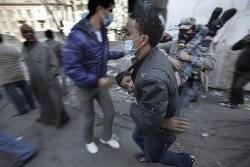Clashes have continued in Egypt with police firing tear gas at demonstrators hurling rocks and broken tiles, as the protesters demanded swift presidential election and an early handover of power by the ruling military.
Thousands of people protested outside the interior ministry in Cairo, the capital, accusing the ruling Supreme Council of Armed Forces (SCAF) of failing to prevent the deaths of 72 people during last week’s football violence.
At least 12 people have been killed in clashes in Cairo and Suez since the match in the Mediterranean city of Port Said.
"The demand is that the army step down politically and announce the start of nominations for the presidential election immediately," Waleed Saleh, an activist, said on Sunday.
The football disaster and tactics of security forces in dealing with protesters has added to anger at the military's handling of the transition, and fuelled calls for the army to return to barracks sooner than it had envisaged.
Protesters blame the police for allowing or even encouraging the violence during the match between al-Ahly and al-Masry on February 1.
Many say the police are using the same heavy-handed tactics against protests as the era of Hosni Mubarak, the toppled president.
The interior minister has blamed provocations by rival fans for the violence at the match although he said there were also security shortcomings.
Mubarak move
Meanwhile, the military-backed government’s reported plan to move Mubarak to a Cairo prison hospital, appeared to have done little to quell the anger of those demonstrating.
Protesters have long complained the army was sparing its former commander the humiliation of jail by keeping him in a military hospital during his trial.
Mubarak has been charged over the deaths of protesters during the 18-day uprising that deposed him.
The hospital in Torah prison, where other former Mubarak officials and allies are held, had been deemed by officials not fit to handle Mubarak's treatment, though the former president's precise ailment is unclear.
Political figures and a civilian advisory body to the military have suggested bringing forward a presidential vote to April or May, from the June date foreseen in the transition timetable of the army, which took power after Mubarak stepped down.
The Muslim Brotherhood, which forms the biggest bloc in a newly elected parliament, added its voice on Saturday to calls for a faster transition.
PHOTO CAPTION
Egyptian protestors carry an injured youth to a filed hospital during clashes with security forces near the Interior Ministry in Cairo, Egypt, Saturday, Feb. 4, 2012.
Al-Jazeera

 Hajj virtues
Hajj virtues